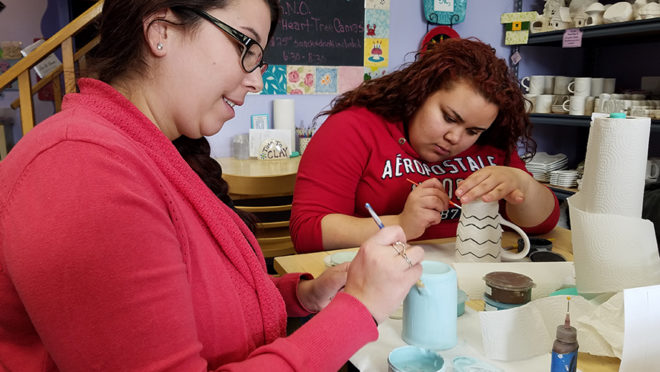About RSEC
Skip to content
Program
The RSEC Academy High School programs

Technology
The RSEC Academy is a Google for Education partner, meaning students can access engaging learning tools anytime, anywhere, on any device. Students are provided Chromebooks to use while in class.
We also have a fully functional science lab, a rare asset for a school of our size,
Success is in the approach
Every academic journey is different, so the education professionals at The RSEC Academy personalize lessons and strategies based on the individual student. Pulling from more than 40 years of experience, the approaches teachers use in the classroom include multiple different techniques for the best possible outcomes.
Direct systematic, small group instruction: LiPS; Report and Story Form; Orton-Gillingham Reading Program; Step Up to Writing; Framing Your Thoughts; Visualize and Verbalize; Master Notebook System; test preparation; individual student accommodations.
Experiential and adventure education: All students attend and participate in unique learning experiences throughout the school year, with the goal of showing progress in positivity, stretching comfort zones, communication and self-advocacy, and personal goals. Through adventure activities, day trips, overnights, and multi-day learning expeditions connected to the school curriculum, we build student self-confidence, connect learning, and develop leadership skills. By stepping out of their comfort zones, students learn perseverance, support and growth.
Social skills: By using fun and engaging experiential activities, students observe models, practice new skills, and receive feedback in natural settings and across the curriculum. Teachers process social skills “in the moment” during the flow of a team challenge or conflict.
Adventure Days: A variety of outings, including orientation activities, a three-day overnight fall retreat, community service days, sports and social events.
Transition: Students begin discussing post-graduate plans in grade eight, and receive proactive guidance for achieving them. Transition opportunities include:
Middle School
Building self-advocacy skills
Responsibility at home, school and in the community
Problem-solving/conflict resolution
Setting goals
Identifying effective versus ineffective habits
Creating new effective, academic habits
Leadership
Career exploration
Direct skill instruction in reading comprehension
Vocabulary development
Mathematics
Speech and language
Assistive technology
Study and organizational skills
Time management (homework, test preparation, project benchmarks)
High School
Vocational programs at area high schools with vocational facilities
Portfolio creation and review
Job shadows
College tours and college fairs
Completing college, training or employment applications
Career exploration
Post-high school testing: We administer the SAT n campus and receive necessary accommodations
Vocational rehabilitation: For those accepted to the Federal Vocational Rehabilitation program, we provide time during school hours for students to work with their vocational rehabilitation counselor
Extracurricular activities at The RSEC Academy
Activities
We incorporate many of our experiential and adventure outings into our academic curriculum and reinforce the life skills and concepts that students experience in the real world. In addition to the options below, we encourage students to create their own groups to explore their interests.
Activities are driven by student interests. These are examples of activities that students have created:
Jam night: play music or learn how with fellow students
Movie night and shopping: a trip to the cinema and mall
Video game night: play Rock Band or other games on the big screen
Weekend sports outings to local games, such as the Manchester Monarchs, New England Revolution, New Hampshire Fisher Cats and Boston Bruins
Adventure-based activities: camping, hiking, and skiing
Cooking classes
Holiday events
Summer program
Keep learning throughout the summer and apply academic and social skills to learning experiences outside the classroom with these summer courses for students ages nine to 21.
Summer courses
Content Area Skill Building: direct systematic instruction in language arts, math and reading based on individual learning goals.
Reading Tutorial: direct instruction in comprehension, fluency, and phonemic awareness.
Writing Tutorial: direct instruction in effective written expression.
Math Tutorial: direct instruction ranging from basic math skills and algebra to geometry and vocational math.
Social Pragmatic Skills: taught through games, challenges, and cooperative initiatives in and out of the academic setting.
Individualized Program: we will create individually tailored programs in many subjects for students who need credit recovery, further refinement or seeking enrichment.
Classroom Without Walls: interactive, hands-on instruction for students to practice problem-solving, interpreting information, comprehension, verbal communication, and cooperative learning. Recent activities have included day trips to museums or sports games, hiking, environmental farm projects, ropes courses, guest speakers, theater productions, and community service.
Career Exploration: explore various careers and post-high school plans using Career Cruising software to identify possible career interests. Talk with business leaders and owners, as well as tour businesses of interest and exposure to resume writing, letter writing, application completion, dressing appropriately for business, and much more.
